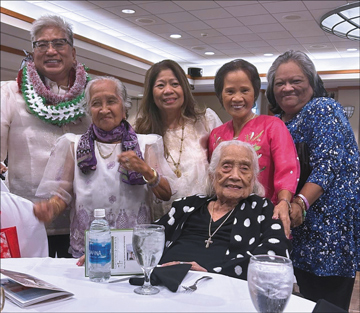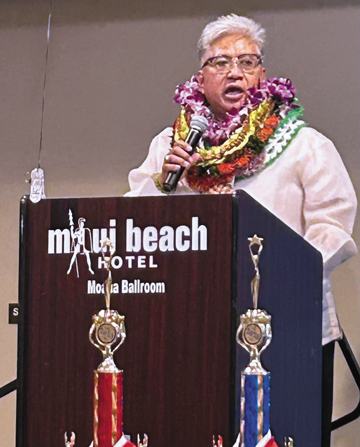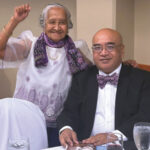
Leap Year 2024 Couldn’t Have Come Sooner for People on Our Island
Gilbert S.C. Keith-Agaran | Photos courtesy Gil Keith-Agaran
2023 will not be remembered fondly for many reasons. The August fires dominated the last half of the year, throwing plans and hopes off-kilter. In part, the devastation that swept away Lahaina town and damaged portions of Upcountry reflects how Maui Nui remains such a small town. The damage to the people and businesses of West Maui (and Olinda and Kula) impacted many residents who didn’t live in Lahaina or on the mountain because family or friends did lose loved ones, homes and jobs. We Mauians remain interconnected whether by koko, chance or choice.
It’s part of being from an island. I was born and raised on Maui, growing up mainly in Pā‘ia (before that Mill closed) in a neighborhood where family and community had meaning and value—you watched out and cared for your neighbors and their families because they looked out for yours. The old-fashioned reciprocity of caring is the best aspect of the Filipino cultural trait of utang na loob—innate gratitude arising from our inner self and character—but it was also something shared with other groups from that era.

At the year-end Rizal Day celebration organized by the Maui Filipino Community Council (MFCC), Distinguished Service awardee Alfredo G. Evangelista blamed me for getting him involved with the Filipino community on O‘ahu. I sincerely apologize to those who over the last three decades have been subjected to Abogado Evangelista’s semi-Jaycees authoritarian community organizing style—a lot of committee meetings, written agendas and after-action meetings (later on during his mellowing years, always over a meal and drinks). No soft-sell persuasion from Tata Fred whether he was a board member or just legal counsel for an organization—he brought Maui Mayor Elmer Cravalho’s My Way or The Highway leadership to many longtime loosely operated groups.
He and I sat through many Filipino community events, installations, pageants and parties that felt prolonged and could have used a stronger hand in starting on time and, more importantly, ending at a reasonable hour. So many times, events and projects benefitted greatly from his penchant for pedantic programming in terms of efficiency and on the surface a fun and smoother event (which you couldn’t tell from the pensive and stern countenance of Attorney Evangelista).

As I’ve grown older, I myself have come to appreciate going with the flow in Filipino events because history shows things always go awry when you least expect (you can’t always rely on technology, for example or volunteers). Just send the next entertainers on stage while the professionals work out the music glitch for the originally scheduled act or make the emcee give away a few more door prizes to kill time.
I was also lucky to have watched the examples of Filipino leaders and to have been mentored and encouraged by people like lawyer B. Martin Luna, trailblazing public citizen Richard “Pablo” Caldito, ILWU union organizer Pepito Ragasa, retired police officer and churchman Rafael Acoba, and businessman Vince Bagoyo and Councilmember Rick Medina. In his remarks, Attorney Evangelista (yielded the balance of allocated talking time by others recognized—Outstanding Youth Elizabeth Thomas, Outstanding Member Judith Piano, and Outstanding Citizen Kit Furukawa), also mentioned two other heroes of mine, the General Aggie Cabebe (who maintained and fostered Filipino folk dancing on Maui) and community force of nature Nancy Andres. (Last year, in getting the Citizenship recognition, I also expressed my gratitude to my elders Manong Alfredo and Manang Bessy Evangelista, among others). Evangelista also mentioned other key participants in raising the Filipino community—entrepreneur Melen Agcolicol, educators Nora Takushi and Elizabeth Ayson, chefs Tante and Telly Urban and Joey and Juvs Macadangdang, businesswoman Teresita Noble and community liaison Kai Pelayo, ballroom dance guru and golf tournament savant Bill Ruidas, artist Phil Sabado and former Maui Mayor Kimo Apana, and graphics maven Lawrence Pascua.

While some think we move together in unison, it’s just public relations and social media magic. I differ from him, even if we both were among the first Maui High School classes at the new Kahului campus. He went off to school in the Midwest before transferring to the University of Southern California and then moving cross-town to attend the University of California at Los Angeles law school. I went back east for undergraduate studies then to the University of California at Berkeley for law school. Fred worked for Ben Cayetano the lawyer full-time; I spent a summer at that firm as a law student but then worked full-time for Ben Cayetano the Governor. Tata Alfredo remains an unapologetic fan of all Los Angeles professional sports teams, including the Lakers, Raiders (yeah, they have moved several times) and the hated dodgers. At least he does cheer as a back-up for the Seattle Seahawks (he married into that fandom). I remain more eclectic—following the Golden State Warriors, Cincinnati Bengals and San Francisco Giants. If you ask him, he’ll probably blame me for our annual donation to the Las Vegas Sports Books on the Raiders, Bengals and Seahawks to make and win the Super Bowl. The reality is we can’t stop just in case one of them actually wins the damn game.
This year MFCC unintentionally balanced the community members honored this year—FBI Abogado Evangelista and anti-Martial Law Furukawa. And two people without any frenemies in the local community—Elizabeth and Judith.
Both noted in some way the need for Maui’s Filipinos to be part of Maui—not just the Pinoy potion. Furukawa noted corruption takes on many forms, including silencing the voices and participation of segments of the community. I’m old enough to recognize Filipinos and the Filipino community throughout my life sometimes seem outside the mainstream, so it’s not a new experience. Furukawa recognized in the aftermath of the Lahaina and Upcountry fires, part of the community’s fight is to provide a collective voice to the often ignored, neglected and discounted Filipino community.
I have the same Sakada background as Tata Alfredo. He knows the transition of a community (old and new) reduced to cheap labor for the Visitor Industry’s back of the house just as the Sakada generation provided the field workforce for the plantations or filling food and other service jobs not viewed as living wage careers. He understands the strong inclination to fit into the broader Maui and Hawai‘i community—especially at a time where pride in being native/Native Hawaiian has been rekindled. But Evangelista noted making Maui home doesn’t require abandoning your ethnic heritage.
In his remarks, he recalled the various people who inspired and mentored him and cajoled his involvement in the community. He concluded any distinguished service award was really a recognition of the collective work of many people—especially those who developed the broader relationships allowing others in the Filipino community to succeed in their chosen activities and professions. Filipinos are part of the fabric of Maui and cannot be unwound from the proverbial Paoay inabel weave.
 Gilbert S.C. Keith-Agaran practices law in Wailuku with Takitani Agaran Jorgensen & Wildman, LLLP. He lives in Central Maui. He says if Pete Johnson scores on 4th and one in Super Bowl XVI at the Silverdome, the Bengals are the team of the 1980s. That’s his story and he’s sticking to it.
Gilbert S.C. Keith-Agaran practices law in Wailuku with Takitani Agaran Jorgensen & Wildman, LLLP. He lives in Central Maui. He says if Pete Johnson scores on 4th and one in Super Bowl XVI at the Silverdome, the Bengals are the team of the 1980s. That’s his story and he’s sticking to it.
